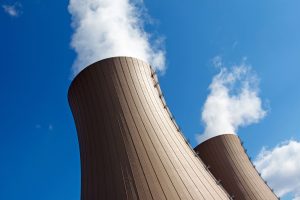Work has officially begun in the village of Ulken, in Almaty Region on the shore of Lake Balkhash, on Kazakhstan’s first nuclear power plant. It will be at least a decade before the plant is completed, and officials say the total investment in the project will be around $14-15 billion.
While Russia was selected to take the lead on constructing Kazakhstan’s first nuclear power plant, China is slated to take the lead on two additional power plants.
On Friday, Kazakh government officials — including the head of Kazakhstan’s Atomic Energy Agency, Almasadam Satkaliyev, and Marat Sultangaziyev, akim of Almaty Region — and Alexey Likhachev, director general of Russia’s Rosatom, marked the launch of the project with a groundbreaking ceremony which involved drilling for a soil sample.
In his remarks, as reported by Kazinform, Satkaliyev stated that the ceremonial start of the project marks the beginning of engineering and survey work. A Rosatom press release stated that initial work will focus on determining an optimal site and preparing designs.
“The launch of engineering surveys in Ulken marks the beginning of the journey toward the first high-capacity nuclear power plant in Kazakhstan’s modern history,” Likhachev said.
In October 2024, Kazakhstan held a referendum on the question of whether the country should pursue the construction of a nuclear power plant. The nuclear question in Kazakhstan is particularly fraught. On the one hand, nuclear power is attractive and within reach. Kazakhstan is believed to possess 12 percent of global uranium reserves and, as of 2022, produced 43 percent of the world’s uranium. But Kazakhstan was the site of 456 nuclear tests carried out by the Soviet Union between 1949 and 1989 at the Semipalatinsk facility. All issues nuclear are especially sensitive.
Although the referendum passed with over 70 percent in favor, the information campaigns and debates ahead of the vote were constricted.
As I remarked in September 2024 ahead of the referendum:
Given Kazakhstan’s constrained political environment, the ultimate vote may not adequately reflect the complexity of public opinion on the issue. Referendums in Kazakhstan don’t fail: Constitutional referendums in 1995 and 2022 passed easily, and a 1995 referendum on extending Nazarbayev’s first post-independence term passed with 96 percent in favor.
As has happened before various referendums and elections, activists in opposition to the proposals have found themselves under pressure.
Activists campaigning against the nuclear power plant did, indeed, meet with pressure and in some cases detention.
In June, Rosatom was selected by the Kazakh authorities to take the lead on the construction of the country’s first nuclear power plant, beating out China’s China National Nuclear Corporation (CNNC), France’s Électricité de France (EDF), and South Korea’s Korea Hydro & Nuclear Power (KHNP).
That announcement was paired with news that China would take the lead on constructing Kazakhstan’s second nuclear power plant. In August, Kazakhstan’s First Deputy Prime Minister Roman Sklyar said that CNNC would also build Kazakhstan’s third nuclear power plant.
There are few details about the latter two projects, with some reports suggesting sites such as Kurchatov, adjacent to the former Semipalatinsk nuclear test site in Kazakhstan’s east, and Aktau, once home to a Soviet-era BN-350 fast neutron reactor, in the country’s west.
Sklyar suggested that locations could be identified before the end of the year.
With regard to the Rosatom project, Sklyar said intergovernmental negotiations were ongoing and that once finalized, the agreement would be submitted to parliament for ratification. He also outlined the general plans: The Ulken plant is envisioned to include two units “with a combined capacity of 2.4 GWe and is expected to be operational by 2035.”
Nuclear power is of considerable interest across the region, which struggles with imbalanced energy resources, aging or poorly modernized infrastructure, and increasing demand for electricity. Oil and gas-rich Kazakhstan imports electricity from Tajikistan, as does Uzbekistan. Both also import gas from Russia, and both are collaborating with Rosatom on nuclear power plants.
A 330-megawatt nuclear power plant, with six reactors, is to be built in Uzbekistan’s Jizzakh Region. Agreements were signed in May 2024 between Rosatom and UzAtom. The first concrete is scheduled for pouring in March 2026.
Neighboring Kyrgyzstan is also eyeing nuclear power to address its growing energy demands. In November 2022, Kyrgyzstan signed an agreement with Rosatom to conduct a feasibility study on the possibility of constructing a small-capacity nuclear power plant. In June 2024, Kyrgyzstan’s authorities lifted a 2019 ban on uranium mining. Earlier this year, the results of the Rosatom feasibility study were submitted to Kyrgyzstan.
































